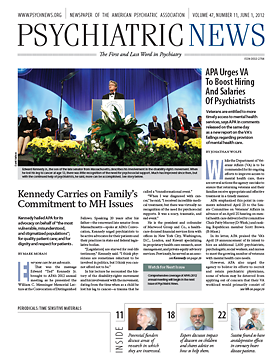Everyone can be an advocate.
That was the message Edward “Ted” Kennedy Jr. brought to APA’s 2012 annual meeting as he presented the William C. Menninger Memorial Lecture at the Convocation of Distinguished Fellows. Speaking 20 years after his father—the renowned late senator from Massachusetts—spoke at APA’s Convocation, Kennedy urged psychiatrists to be active advocates for their patients and their practices in state and federal legislative bodies.
“[Legislators] are starved for real-life testimony,” Kennedy said. “I think physicians are sometimes reluctant to be involved in politics, but I think you cannot afford not to be.”
In his lecture he recounted the history of the disability-rights movement and his involvement with the movement, dating from the time when as a child he lost his leg to cancer—a trauma that he called a “transformational event.”
“When I was diagnosed with cancer,” he said, “I received incredible medical treatment, but there was virtually no recognition of the need for psychosocial supports. It was a scary, traumatic, and sad event.”
He is the president and cofounder of Marwood Group and Co., a health-care-focused financial services firm with offices in New York City, Washington, D.C., London, and Kuwait specializing in proprietary health care research, asset management, and private equity advisory services. Previously, he served as an associate and later as counsel to the law firm of Wiggin and Dana in New Haven, Conn. His health-law practice focused primarily on state and federal regulatory and reimbursement issues affecting hospitals, home-care agencies, long-term-care providers, physicians, and mental health professionals. His wife, Katherine, is a psychiatrist and member of APA.
Kennedy noted his family’s longstanding interest in and support of issues related to mental health. His father served 47 years as a senator from Massachusetts and was a staunch supporter of parity coverage for the treatment of mental illness and of funding for research on mental illness. His brother, Patrick Kennedy, was a member of the U.S. House of Representatives from Rhode Island from 1995 to 2011 and was instrumental in the passage of the Paul Wellstone and Pete Domenici Mental Health Parity and Addiction Equity Act, signed into law on October 3, 2008.
And at the Convocation, Kennedy shared some of his insights into the “insider baseball” of Washington politics, predicting that if the Supreme Court—whose ruling on the constitutionality of the “individual mandate” in the health care reform law is anticipated this summer—should rule against the law it would rebound to President Obama’s benefit in the fall elections.
“It will force the Republicans to come up with an alternative,” Kennedy said, adding that so far the Republicans don’t have an alternative.
At the Convocation, Kennedy hailed the advocacy efforts of APA. “You should all be proud on the huge impact APA has had on efforts to serve the most vulnerable, misunderstood, and stigmatized populations, for the way you have advocated for quality patient care, and for dignity and respect for each and every person. … You don’t see patients for their disabilities but for their humanity. I congratulate you for what you have done.”


